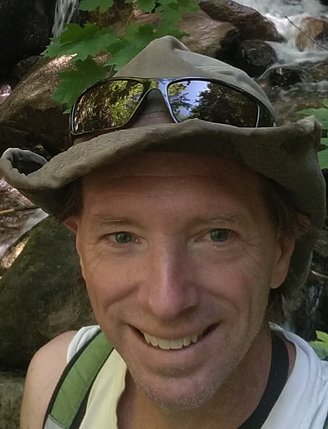The two candidates for the Area 4 seat on Arcata School District’s board of trustees are running casual campaigns. Incumbent Joe McKinzie, who previously worked as a classified professional for several local schools, runs for the sake of community and public education. Challenger Brian Hudgens, an ecologist, feels his expertise could benefit the district as it navigates COVID-19 reopening plans.
The ASD school board oversees 500 students and two schools — Arcata Elementary and Sunny Brae Middle. Four charter schools — Coastal Grove, Redwood Coast Montessori, Union Street and Fuente Nueva — are also part of the district, but they each have independent governance.
The Area 4 seat represents a large sector of southern Arcata and downtown. This is the first year ASD is doing trustee-area elections, which were adopted because of a settlement relating to the California Voting Rights Act. More on that later. For now, LoCO presents McKinzie and Hudgens, two Arcata citizens vying to represent citizens in Area 4.

McKinzie.
McKinzie, who was previously the classified union president at Northern Humboldt Union High School District, mentioned a few times during a phone call with the Outpost that he’d like to see ASD become more of a “public hub” for the community. “Kind of like a small entity of what the county is doing,” McKinzie said. For instance, expanding the gardens at each site and using the produce in ASD kitchens would be one way to serve the community, McKinzie said, but he noted that it would require introducing a new position to farm successfully.
Between keeping staff on board while maintaining fair wages and covering medical costs, “the number one challenge is funding,” McKinzie said. On top of that, it’s hard to keep every program afloat. “Not only reading, writing, arithmetic and everything — you need the arts too. So it’s hard to sometimes justify that when you’re just trying to get by,” he said. To navigate budget cuts, McKinzie said he always returns to what is best for students. “They’re your number one product, they’re the ones that will suffer the most from all of this.”
McKinzie first joined the board to learn more about public school governance. Since then, he’s observed difficulties that arise with having several small school districts. “Unification of the school districts is kind of on the radar for me,” he said. Between boards, finances, busing and food, there is a lot of repetitiveness, McKinzie said, adding that merging Arcata’s many districts would benefit the schools in terms of governance because there would be a larger pool of trustee candidates to choose from. McKinzie cited his own entrance to the ASD board — which he got by “default” because no one ran against him — as evidence that unification would support the democratic process that is meant to establish school boards. Right now, many trustees find their way onto boards by appointment.
Though McKinzie is interested in merging districts, he said he’s not sure how it would be done.
In terms of COVID, McKinzie is committed to distance learning, for the time being. “That’s one thing I’m very happy that we’ve been kind of ahead on,” he said. “My personal feeling on that is if the school board members [are] not meeting in person, we shouldn’t be sending students and teachers back into it.”
Following COVID, McKinzie said he foresees implementing an enrichment program to help students rebound from pandemic-era learning. “Even with quality, excellent stuff from the teachers, there’s going to be students who are going to be behind where they should be,” he said. Regardless of whether schools are in-person or virtual, the number of required instructional minutes were reduced for the 2020-2021 school year, thanks to California Senate Bill 98. Grades 1 to 3 dropped from 280 to 230 minutes and grades 4 to 8 went from 300 to 240 minutes. McKinzie thinks that young students in particular will need extra support in reading, phonics and mathematics coming out of COVID.

Hudgens.
Hudgens has written epidemic response plans for endangered wildlife species in the past, and feels his experience would benefit the district in terms of developing reopening plans. He has a daughter in the district, and said he’d like to see a “very transparent process in place and steps in place” as related to reopening.
“Right now it kind of feels like we’re making a decision moment by moment, and it’s not clear what the criteria are for going one way or another,” he said. The district has sent surveys out to assess the needs and desires of families, but Hudgens wants more clarity regarding how those survey results are being used, and is an advocate for more community involvement in the decision making process.
Hudgens said he would like ASD to adopt a hybrid learning format, with small groups of kids going to campus for in-person instruction. However, he also stressed that he doesn’t want to dictate that choice, but rather “help facilitate making sure all voices are heard.”
District Superintendent Luke Biesecker told the Outpost that family opinions are split pretty equally three ways between reopening, hybrid learning and continuing with distance learning.
Though the schools are teaching virtually, the district has also been running a camp program since June. The on-site program at Arcata Elementary serves about 50 students — mostly elementary students — who are separated into pods of ten. It runs from 7:30-5:30 on weekdays, and provides a space for students of families with varying needs. Foster and homeless students have priority, as well as children of employees who are running the program. Classified staff facilitate the students, maintain social distancing and ensure that everyone wears a mask. The district has also started to provide in-person extra support to students with disabilities at the Sunny Brae campus.
“The camp program seems to be tremendously successful,” Biesecker said. “We’re getting a lot of positive feedback from our community.”Biesecker added that there is a waiting list of more families who want in on the program, and that the board is discussing ways to expand it.
Hudgens primarily focused on streamlining communication between the district and families in terms of COVID decisions during his interview with the Outpost, but followed up with additional goals in an email.
To address equity during virtual learning, Hudgens suggested staggering class schedules between different grades so that families with a few kids in the district will have less strain on their internet connection.
Following COVID, Hudgens said he’d encourage student-led initiatives in terms of reducing the district’s environmental footprint.
He also indicated that as a board member he would promote a diverse staff, especially at the middle school. “Kids are becoming more aware of who they are, and thinking about how they ‘fit in,’” Hudgens wrote. “Having a diverse faculty and school leadership makes it more likely that those kids who need a trusted adult to connect with will find someone who they feel understands them.”
CLICK TO MANAGE